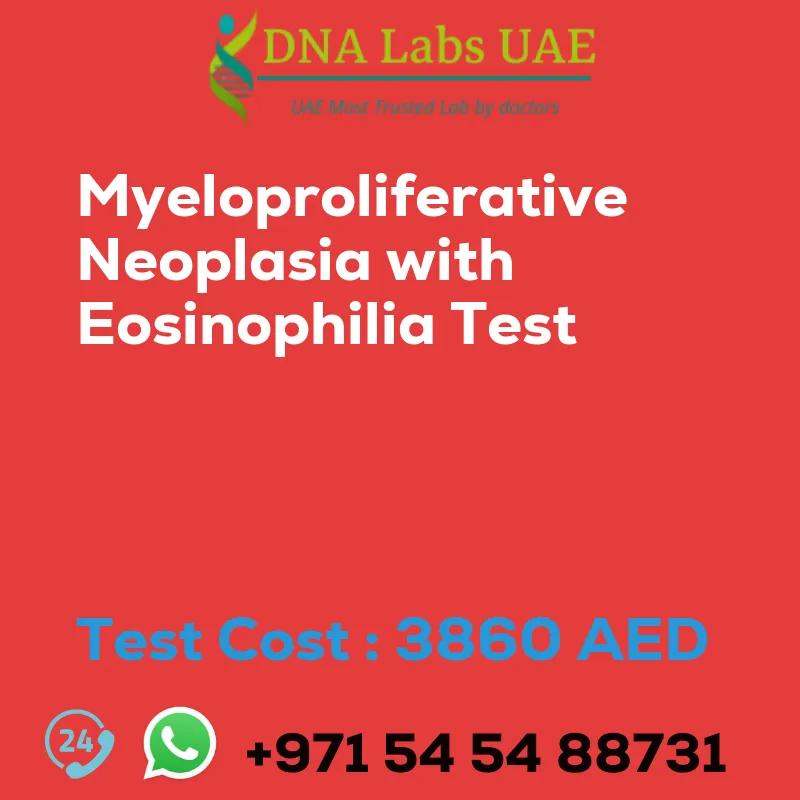Myeloproliferative Neoplasia with Eosinophilia Test
At DNA Labs UAE, we offer the Myeloproliferative Neoplasia with Eosinophilia (MPN-Eo) test to help diagnose and monitor this condition. MPN-Eo is characterized by an abnormal increase in eosinophil count, and certain genetic mutations are associated with this condition.
Test Details
Test Name: Myeloproliferative Neoplasia with Eosinophilia
Test Components: Complete Blood Count (CBC), Bone Marrow Biopsy, Genetic Testing, Cytogenetic Analysis, Molecular Testing, Imaging Studies
Price: 3860.0 AED
Sample Condition: 3 mL (2 mL min.) whole blood from 1 Lavender Top (EDTA) tube, 2 mL (1.5 mL min.) Bone marrow in 1 Lavender Top (EDTA) tube, 3 mL (2 mL min.) Bone marrow in 1 Green Top (Sodium Heparin) tube. Ship at 18-22°C. DO NOT FREEZE.
Report Delivery: Sample Daily by 4 pm; Report 7 Working days
Method: Electrical impedence, Microscopy, FISH
Test Type: Cancer
Doctor: Oncologist, Hematologist
Test Department: CYTOGENETICS
Pre Test Information: Duly filled Chromosome & FISH Analysis Requisition form (Form 17) is mandatory.
Symptoms and Diagnosis
Myeloproliferative Neoplasia with Eosinophilia does not have a specific test for diagnosis. However, several tests can help in the diagnosis and monitoring of the condition.
1. Complete Blood Count (CBC): This test measures the number and types of blood cells, including eosinophils. Increased eosinophil count is characteristic of MPN-Eo.
2. Bone Marrow Biopsy: A sample of bone marrow is taken to examine the cells and their characteristics. This test helps determine if there is an abnormal increase in eosinophils and other blood cells.
3. Genetic Testing: Certain genetic mutations, such as PDGFRA, PDGFRB, and FGFR1, are associated with MPN-Eo. Genetic testing can identify these mutations and aid in the diagnosis.
4. Cytogenetic Analysis: This test examines the chromosomes in the bone marrow cells to identify any abnormalities. Specific chromosomal changes, such as inv(16) or t(8;21), may be associated with MPN-Eo.
5. Molecular Testing: Molecular tests can detect specific gene mutations associated with MPN-Eo, such as JAK2, CALR, or MPL mutations. These tests can help confirm the diagnosis and guide treatment decisions.
6. Imaging Studies: Imaging techniques like ultrasound, CT scan, or MRI may be used to assess the size and involvement of organs affected by MPN-Eo, such as the spleen or liver.
It is important to consult with a hematologist or oncologist who specializes in MPNs for a proper evaluation and interpretation of test results.
| Test Name | MYELOPROLIFERATIVE NEOPLASIA WITH EOSINOPHILIA Test |
|---|---|
| Components | |
| Price | 3860.0 AED |
| Sample Condition | 3 mL (2 mL min.) whole blood from 1 Lavender Top (EDTA) tube AND 2 mL (1.5 mL min.) Bone marrow in 1 Lavender Top (EDTA) tube AND3 mL (2 mL min.) Bone marrow in 1 Green Top (Sodium Heparin) tube. Ship at 18-22?\u00f8C. DO NOT FREEZE.Duly filled Chromosome & FISH Analysis Requisition form (Form 17) is mandatory. |
| Report Delivery | Sample Daily by 4 pm; Report 7 Working days |
| Method | Electrical impedence, Microscopy,FISH |
| Test type | Cancer |
| Doctor | Oncologist, Hematologist |
| Test Department: | CYTOGENETICS |
| Pre Test Information | Duly filled Chromosome & FISH Analysis Requisition form (Form 17) is mandatory. |
| Test Details | There is no specific test for myeloproliferative neoplasia with eosinophilia (MPN-Eo). However, several tests can help diagnose and monitor the condition. These may include: 1. Complete Blood Count (CBC): This test measures the number and types of blood cells, including eosinophils. MPN-Eo is characterized by increased eosinophil count. 2. Bone Marrow Biopsy: A sample of bone marrow is taken to examine the cells and their characteristics. This test helps determine if there is an abnormal increase in eosinophils and other blood cells. 3. Genetic Testing: Certain genetic mutations, such as PDGFRA, PDGFRB, and FGFR1, are associated with MPN-Eo. Genetic testing can identify these mutations and aid in the diagnosis. 4. Cytogenetic Analysis: This test examines the chromosomes in the bone marrow cells to identify any abnormalities. Specific chromosomal changes, such as inv(16) or t(8;21), may be associated with MPN-Eo. 5. Molecular Testing: Molecular tests can detect specific gene mutations associated with MPN-Eo, such as JAK2, CALR, or MPL mutations. These tests can help confirm the diagnosis and guide treatment decisions. 6. Imaging Studies: Imaging techniques like ultrasound, CT scan, or MRI may be used to assess the size and involvement of organs affected by MPN-Eo, such as the spleen or liver. It is important to consult with a hematologist or oncologist who specializes in MPNs for a proper evaluation and interpretation of test results. |







